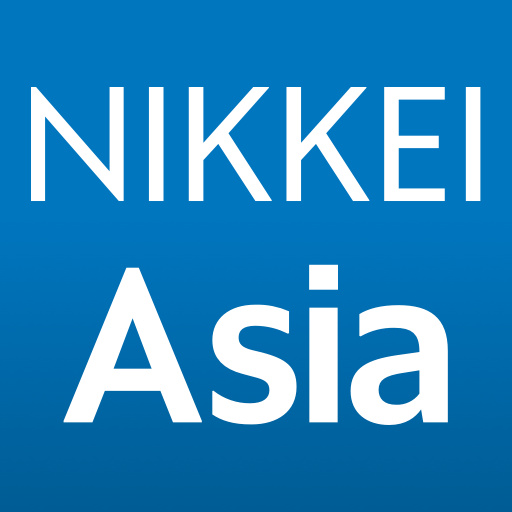
YIFAN YU, Nikkei staff writer
December 25, 2024
PALO ALTO, California -- It has been an unexpectedly hectic holiday travel season for Victoria Chen, who has been preparing for what could possibly be her last trip outside the U.S. for the next four years.
Chen, a 31-year-old software engineer at one of the country's biggest tech companies in the San Francisco Bay Area, was originally planning to visit her family in China for the Lunar New Year in late January. But the day after Donald Trump was projected to have won reelection as U.S. president in November, she rescheduled her entire trip.
"I'm not going to take any chances. I'm going home to see my family, possibly for the last time in the next four years, and then I'll stay put in the U.S. while Trump is in office," Chen said, adding that she altered her plans despite the hefty cost of changing flights.
Chen is not the only immigrant tech worker rescheduling or squeezing in one last trip overseas before Trump takes office on Jan. 20.
Their fear is that his return will herald the kind of hard-line immigration policies that caused such upheaval during his first term, and even the presence of Elon Musk -- who has called to "greatly increase legal immigration" -- in the president's inner circle is not expected to help.
Amazon, Samsung Electronics and other tech companies sent out emails to their international employees warning about travel risks after Trump was elected.
"Strongly consider rescheduling any travel that will have you return to the United States on or after January 20, 2025," read one of the emails sent by Amazon's immigration law firm and reviewed by Nikkei Asia. Universities have also emailed international students, urging them to come back before Trump's inauguration.
Amazon did not respond to requests for comment from Nikkei Asia.
"We regularly communicate with employees who may be affected by potential changes to travel and immigration policies," said a Samsung spokesperson.
Tech companies in the U.S. rely heavily on workers from overseas. In 2024 alone, Amazon sponsored more than 9,265 workers on H-1B visas, according to data from United States Citizenship and Immigration Services.
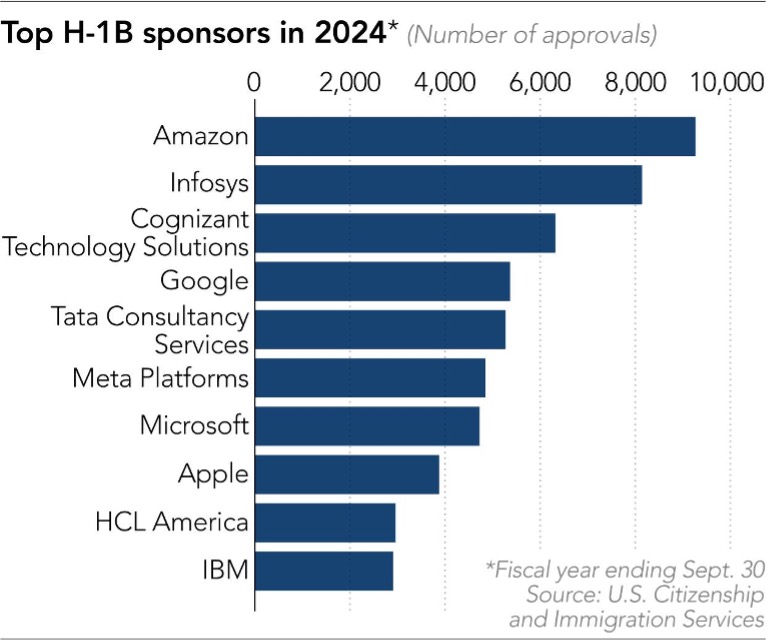
The H-1B is a temporary working visa primarily used by the tech industry to hire highly skilled immigrants. The majority of H-1B visa holders are from Asia, accounting for 245,085 of the 265,777 such visas issued in 2023, according to data from the U.S. Department of State. India made up approximately 72% of the total, followed by China at 12%.
"We're absolutely really worried. ... We know it's not going to get better," said Monique Kornfeld, an immigration lawyer based in Massachusetts. "We know it's only going to get worse based on the prior administration, based on everything he said."
Immigration was a key issue in the 2024 election, with Trump speaking at length about his plans for cracking down on illegal immigrants. But while he talked little about legal immigrants on the campaign trail, his first term suggests that high-skilled foreign workers may also be in for a bumpy four years.
In June 2020, Trump barred the issuance of many new work visas, including under the H-1B program, claiming it would protect American jobs during the COVID-19 pandemic. The order was blocked by a judge later that year, saying it overstepped the president's authority.
In October 2020, the Department of Homeland Security and Department of Labor under Trump announced several major changes to the H-1B rules, including raising the minimum salary requirement and narrowing the definition of "specialty occupations" eligible for the program. The Homeland Security Department estimated that as many as one-third of all H-1B petitions would likely be rejected under the new rules, which were later blocked by a court.
Even so, the denial rate for H-1B applications skyrocketed during the first Trump administration, reaching 24% in 2018, the highest since 2009. The denial rate hovered around 2% to 4% during the first three years of President Joe Biden's administration, according to an analysis by National Foundation for American Policy, a nonprofit organization focused on immigration issues that is based in Arlington, Virginia.
"I would expect that they're going to probably continue to be as consistent as they were during the prior Trump administration," Joshua Bratter, a Miami-based immigration lawyer, said of the denial rates. "His administration has made it clear that the H-1B is not a very favored category."
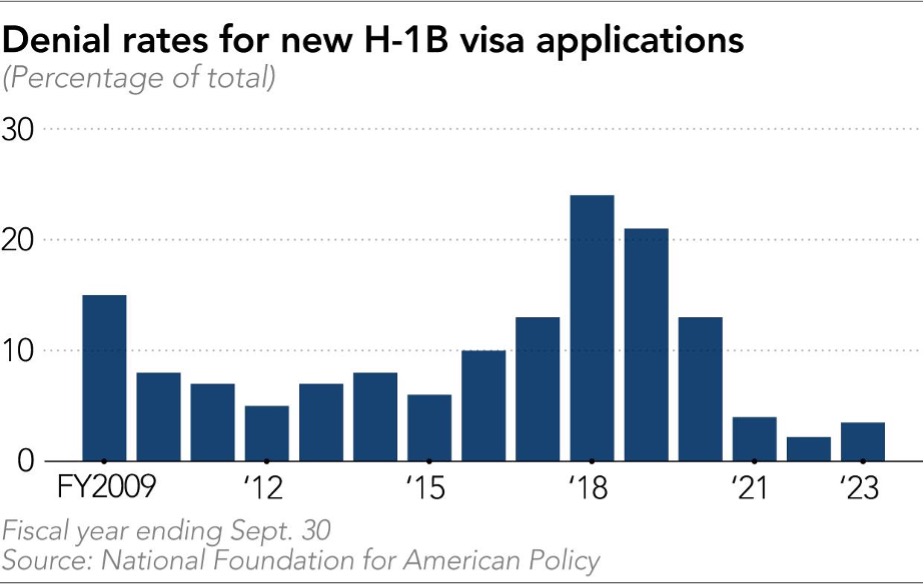
On a podcast released during the campaign, Trump said foreign students studying in U.S. colleges should automatically get a green card, though his campaign spokesperson quickly walked back on the comment, saying only that "the most skilled graduates who can make significant contributions to America" would be able to stay. These would be subject to "the most aggressive vetting process" to "exclude all communists, radical Islamists, Hamas supporters, America haters and public charges," the spokesperson added.
Lawyers and legal experts told Nikkei Asia they do not expect Trump to follow through on his green card comment. What they do expect are quick changes of immigration policies, including potential travel bans, that could be imposed as soon as Jan. 20.
"In the prior administration, executive orders were used quite liberally as a means for advancing rapidly changed laws," Bratter said. Trump issued an executive order barring people from certain Muslim countries from entering the U.S. a week after he took office in 2017.
Foreign workers in the U.S. with a valid H-1B petition approval do not need a visa stamp to remain and work in the country, but they do need a valid visa for reentry if they make a trip abroad.
These visas are issued by consulates in overseas countries, and if Trump administration heightens scrutiny of immigrants, the approval times and denials could both rise.
"A lot of attorneys will tell people, 'Don't travel if you don't have to, because you don't know how long you'll get stuck outside the U.S. or [if you will] even be able to get back in,'" Kornfeld said.
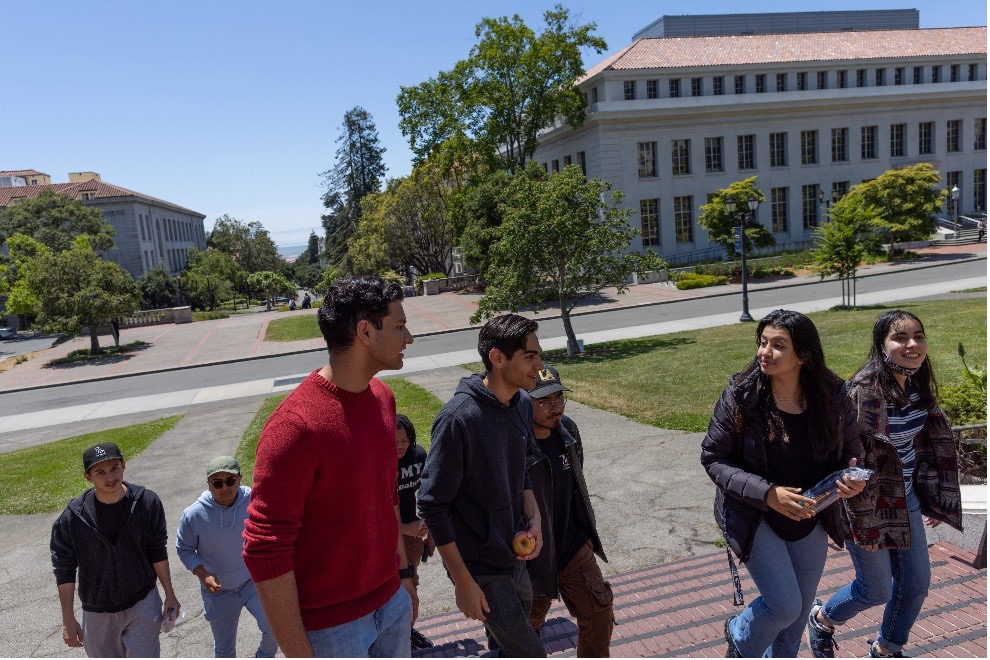
Prospective students tour the University of California, Berkeley campus on Jun. 8, 2023. Some universities have warned foreign students about possible overseas travel disruption under Trump. © Reuters
Online communities used by tech workers such as Blind and 1point3acres have been filled with posts warning against overseas trips and voicing concerns about receiving new H-1B visa stamps since Trump was elected.
Amid fear and uncertainties, some Asian tech immigrants are now pinning their hopes on one person: Musk.
Originally an immigrant from South Africa, Musk has been a vocal advocate for streamlining the immigration process for highly skilled workers. The tech billionaire was on an H-1B visa before gaining permanent U.S. residency.
His companies also rely on foreign tech workers. Tesla, for example, was the 22nd biggest sponsor of H-1B applications in 2024, with 1,767 approved petitions.
David O. Sacks, a longtime venture capitalist appointed by Trump to serve as White House AI and crypto czar as well as head of the Presidential Council of Advisors for Science and Technology, was also an immigrant from South Africa.
Musk has emerged as a member of Trump's inner circle and was praised by the president-elect in his victory speech after the tech billionaire spent months and millions of dollars campaigning for him.
But Musk has not been appointed to any official government roles nor has he proposed any actual policy reforms regarding immigration procedures. He was tapped by Trump to lead the Department of Government Efficiency, but this is a presidential council, not an official government branch.
Musk might also find his stance on immigration at odds with that of other Trump advisers and the Republican Congress.
"Even if you did have Elon Musk whisper in his ear saying, 'Yes, yes, my friends and I, the tech millionaires, we want more STEM (science, technology, engineering and mathematics) workers, we want you to increase the number of green cards to STEM people,' you still have Stephen Miller on the other side and the congressional Republicans who will say, 'No, we want to restrict immigration," Kornfeld said. "You have two competing visions [for immigration policies] right now."
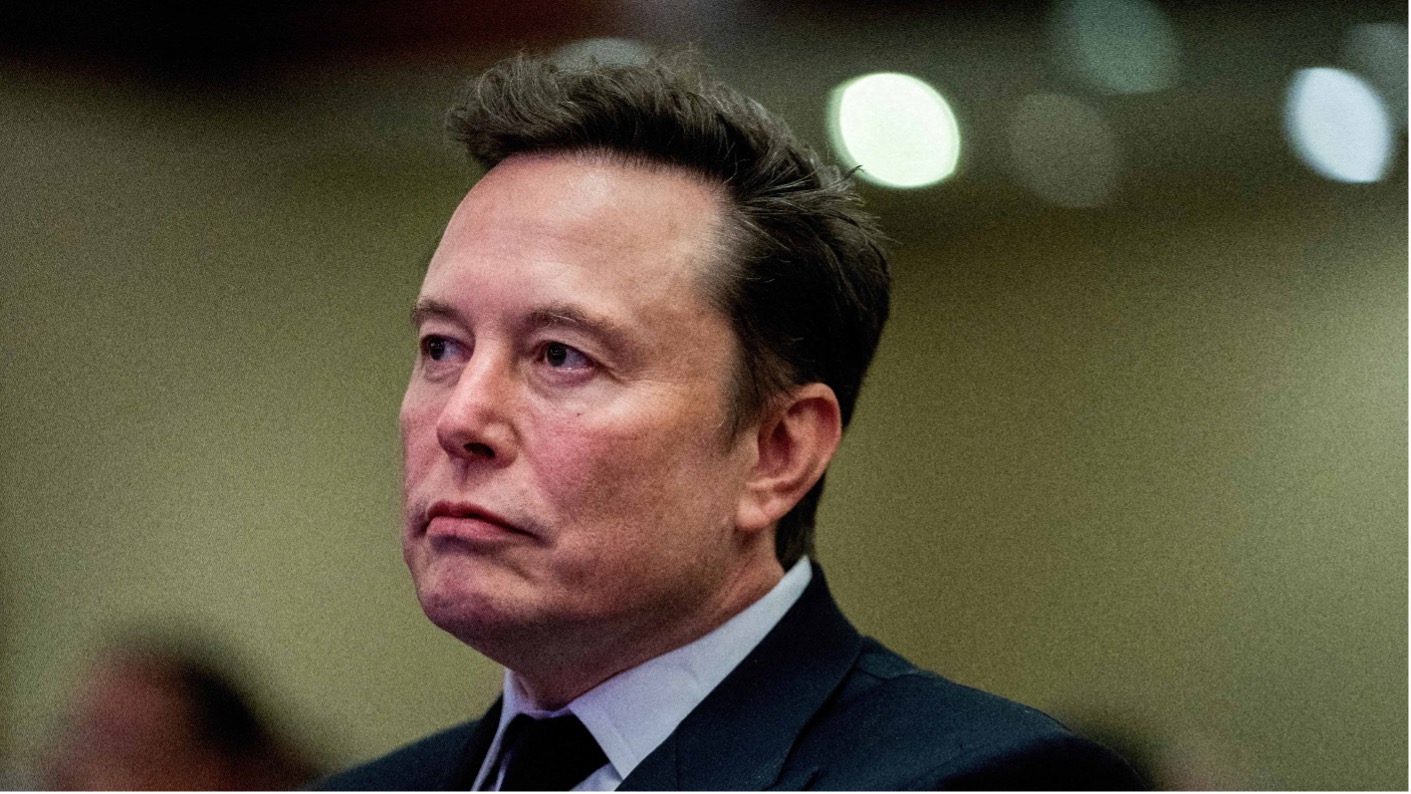
Elon Musk listens as U.S. President-elect Donald Trump speaks during a meeting with House Republicans at the Hyatt Regency hotel in Washington on Nov. 13. © Reuters
Stephen Miller, an immigration hard-liner who advocated for the 2017 Muslim travel ban, was announced as Trump's homeland security adviser and White House deputy chief of staff for policy in November.
Miller is known for his role of drafting some of the Trump administration's strongest immigration plans during his first term, including the controversial "zero-tolerance" policy that led to the separation of children from their parents at the U.S.-Mexico border.
Driven by Miller, the first Trump administration also ramped up scrutiny of Chinese students, especially those in technology and science fields. This led to the revocation of thousands of Chinese students' visas for suspected links to military-civil fusion research facilities.
As U.S.-China tensions continue to rise, immigration policies framing immigrants from China as a national security risk are expected to continue as well.
"They don't have to be explicit about it, but they can work their wonders by just making sure that Chinese have a higher vetting level [during visa and green card applications]," Kornfeld said.
Meanwhile, the people most likely to be affected by such policies are not waiting around for Musk or anyone else to save them. Some, like Chen, are rescheduling or canceling overseas trips, while others are attempting to expedite their immigration process.
Lawyers told Nikkei Asia that there has been a surge in H-1B and green card petitions since November as people rush to file before Jan. 20.
"The volume of cases in the waning days of this administration has intensified and spiked considerably, and it's put a lot of pressure on the limited resources of the agency," Bratter said. "Anytime there's change, anytime there's strong language, there is reason for fear."